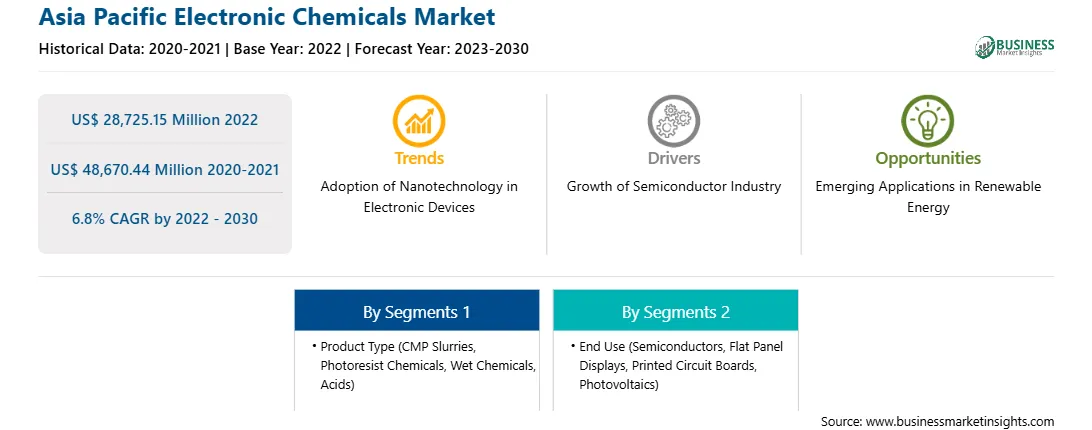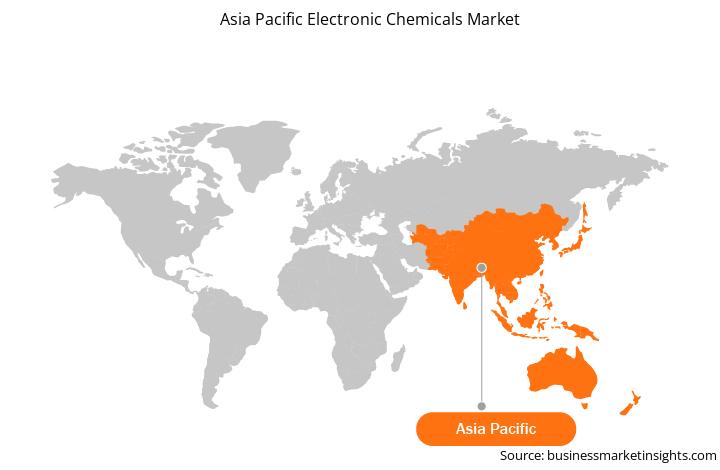The Asia Pacific electronic chemicals market was valued at US$ 28,725.15 million in 2022 and is expected to reach US$ 48,670.44 million by 2030; it is estimated to register a CAGR of 6.8% from 2022 to 2030.
Electronics are essential components of solar photovoltaic (PV) systems. Monitoring systems with electronic sensors and communication modules enable real-time performance monitoring and remote management of solar photovoltaic systems. Power converters, pitch control systems, and grid-tie converters are used to convert variable wind energy into stable AC electricity. Electronic components such as sensors, actuators, and control algorithms optimize turbine performance. Moreover, electronic components are used in energy storage systems and smart grid technologies. Electronics are the major contributors to the electric vehicle charging infrastructure, which supports the adoption of renewable energy-powered electric vehicles. According to the Chinese government report published in 2023, the number of charging stations for electric vehicles increased at a rapid pace in China in 2022. China reported the presence of 5.21 million charging stations by the end of 2022, including more than 2.59 million built in 2022. According to the International Energy Agency 2023 report, the renewable power capacity is expected to increase in the next five years, of which solar PV and wind energy accounted for 96% of power capacity, as their power generation costs are lower than fossil and non-fossil alternatives. Solar PV and wind energy capacity are forecast to double by 2028 compared to 2022. The continuous growth in the economic attractiveness of PV and increasing government policy support, especially in China, the US, the European Union, and India, are expected to further accelerate capacity growth in the coming years. Thus, the emerging applications of electronics in renewable energy is further expected to create lucrative opportunities for the electronic chemicals market.
Electronics and semiconductor manufacturing in Asia Pacific has been a major driver of global trade. Asia Pacific is a global hub for the production and export of technical consumer goods-including consumer electronics such as laptops, desktops, cellphones, radio sets, sound systems, and televisions-and other essential electronic parts and domestic appliances. The increase in the number of on-fleet vehicles in Asian countries such as China, India, and South Korea is propelling the demand for PCBs and semiconductors. China is one of the high-skilled manufacturing hubs, whereas India, South Korea, and Taiwan are considered attractive business destinations for electronics companies looking for medium-skilled manufacturing infrastructure and low labor costs. According to the International Organization of Motor Vehicle Manufacturers report, motor vehicle production in Asia Pacific was estimated to be ~46.73 million units in 2021. As battery technology continues to improve, Asia Pacific is expected to become a key hub for electric vehicle production. China has emerged as one of the largest electric vehicle markets globally, supported by government policies promoting electric vehicles. According to a report released by the China Passenger Car Association (CPCA), in 2022, Tesla Inc delivered 83,135 made-in-China electric vehicles, indicating growth in sales of electric vehicles from 2021. Thus, the growth in consumer electronics and the electric vehicle industry is projected to drive the demand for electronic chemicals.
Strategic insights for the Asia Pacific Electronic Chemicals provides data-driven analysis of the industry landscape, including current trends, key players, and regional nuances. These insights offer actionable recommendations, enabling readers to differentiate themselves from competitors by identifying untapped segments or developing unique value propositions. Leveraging data analytics, these insights help industry players anticipate the market shifts, whether investors, manufacturers, or other stakeholders. A future-oriented perspective is essential, helping stakeholders anticipate market shifts and position themselves for long-term success in this dynamic region. Ultimately, effective strategic insights empower readers to make informed decisions that drive profitability and achieve their business objectives within the market. The geographic scope of the Asia Pacific Electronic Chemicals refers to the specific areas in which a business operates and competes. Understanding local distinctions, such as diverse consumer preferences (e.g., demand for specific plug types or battery backup durations), varying economic conditions, and regulatory environments, is crucial for tailoring strategies to specific markets. Businesses can expand their reach by identifying underserved areas or adapting their offerings to meet local demands. A clear market focus allows for more effective resource allocation, targeted marketing campaigns, and better positioning against local competitors, ultimately driving growth in those targeted areas.Asia Pacific Electronic Chemicals Strategic Insights

Asia Pacific Electronic Chemicals Report Scope
Report Attribute
Details
Market size in 2022
US$ 28,725.15 Million
Market Size by 2030
US$ 48,670.44 Million
Global CAGR (2022 - 2030)
6.8%
Historical Data
2020-2021
Forecast period
2023-2030
Segments Covered
By Product Type
By End Use
Regions and Countries Covered
Asia-Pacific
Market leaders and key company profiles
Asia Pacific Electronic Chemicals Regional Insights

The Asia Pacific electronic chemicals market is segmented into product type, end use, and country.
Based on product type, the Asia Pacific electronic chemicals market is categorized into CMP slurries, photoresist chemicals, wet chemicals, acids, and others. The wet chemicals segment held the largest market share in 2022.
In terms of end use, the Asia Pacific electronic chemicals market is segmented into semiconductors, flat panel displays, printed circuit boards, photovoltaics, and others. The semiconductors segment held the largest market share in 2022.
By country, the Asia Pacific electronic chemicals market is segmented into China, Australia, India, Japan, South Korea, and the Rest of Asia Pacific. China dominated the Asia Pacific electronic chemicals market share in 2022.
FUJIFILM Holdings Corp, Songwon Industrial Co Ltd, PVS Chemical Solutions Inc, Hitachi High-Tech Corp, Solvay SA, BASF SE, Linde Plc, Honeywell International Inc, RBP Chemical Technology Inc, and Esprix technologies LP are some of the leading companies operating in the Asia Pacific electronic chemicals market.
The Asia Pacific Electronic Chemicals Market is valued at US$ 28,725.15 Million in 2022, it is projected to reach US$ 48,670.44 Million by 2030.
As per our report Asia Pacific Electronic Chemicals Market, the market size is valued at US$ 28,725.15 Million in 2022, projecting it to reach US$ 48,670.44 Million by 2030. This translates to a CAGR of approximately 6.8% during the forecast period.
The Asia Pacific Electronic Chemicals Market report typically cover these key segments-
The historic period, base year, and forecast period can vary slightly depending on the specific market research report. However, for the Asia Pacific Electronic Chemicals Market report:
The Asia Pacific Electronic Chemicals Market is populated by several key players, each contributing to its growth and innovation. Some of the major players include:
The Asia Pacific Electronic Chemicals Market report is valuable for diverse stakeholders, including:
Essentially, anyone involved in or considering involvement in the Asia Pacific Electronic Chemicals Market value chain can benefit from the information contained in a comprehensive market report.